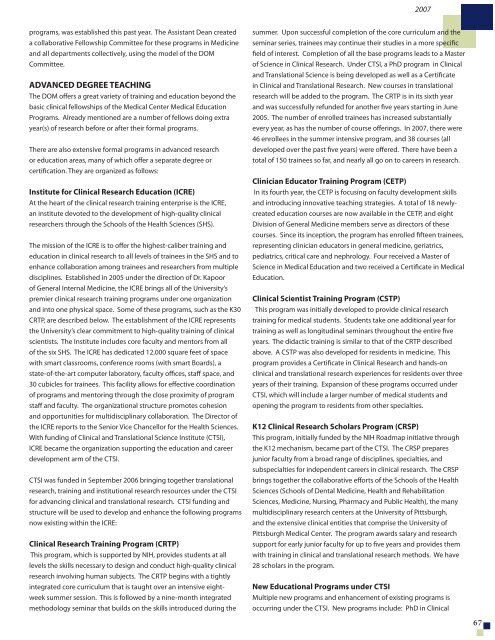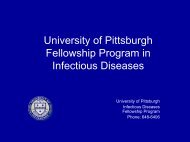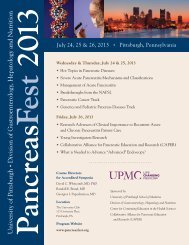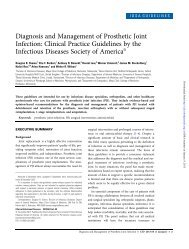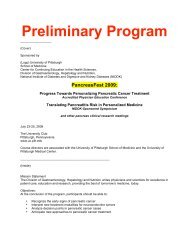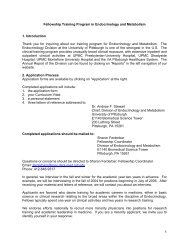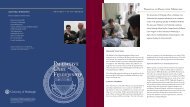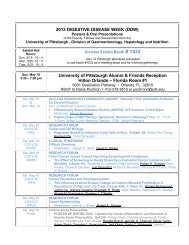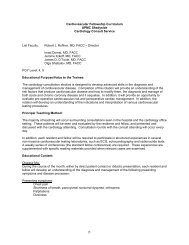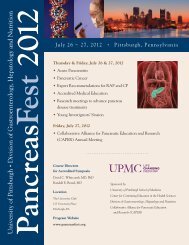2009 DOM Annual Report - Department of Medicine - University of ...
2009 DOM Annual Report - Department of Medicine - University of ...
2009 DOM Annual Report - Department of Medicine - University of ...
- No tags were found...
Create successful ePaper yourself
Turn your PDF publications into a flip-book with our unique Google optimized e-Paper software.
2007programs, was established this past year. The Assistant Dean createda collaborative Fellowship Committee for these programs in <strong>Medicine</strong>and all departments collectively, using the model <strong>of</strong> the <strong>DOM</strong>Committee.ADVANCED DEGREE TEACHINGThe <strong>DOM</strong> <strong>of</strong>fers a great variety <strong>of</strong> training and education beyond thebasic clinical fellowships <strong>of</strong> the Medical Center Medical EducationPrograms. Already mentioned are a number <strong>of</strong> fellows doing extrayear(s) <strong>of</strong> research before or after their formal programs.There are also extensive formal programs in advanced researchor education areas, many <strong>of</strong> which <strong>of</strong>fer a separate degree orcertification. They are organized as follows:Institute for Clinical Research Education (ICRE)At the heart <strong>of</strong> the clinical research training enterprise is the ICRE,an institute devoted to the development <strong>of</strong> high-quality clinicalresearchers through the Schools <strong>of</strong> the Health Sciences (SHS).The mission <strong>of</strong> the ICRE is to <strong>of</strong>fer the highest-caliber training andeducation in clinical research to all levels <strong>of</strong> trainees in the SHS and toenhance collaboration among trainees and researchers from multipledisciplines. Established in 2005 under the direction <strong>of</strong> Dr. Kapoor<strong>of</strong> General Internal <strong>Medicine</strong>, the ICRE brings all <strong>of</strong> the <strong>University</strong>’spremier clinical research training programs under one organizationand into one physical space. Some <strong>of</strong> these programs, such as the K30CRTP, are described below. The establishment <strong>of</strong> the ICRE representsthe <strong>University</strong>’s clear commitment to high-quality training <strong>of</strong> clinicalscientists. The Institute includes core faculty and mentors from all<strong>of</strong> the six SHS. The ICRE has dedicated 12,000 square feet <strong>of</strong> spacewith smart classrooms, conference rooms (with smart Boards), astate-<strong>of</strong>-the-art computer laboratory, faculty <strong>of</strong>fices, staff space, and30 cubicles for trainees. This facility allows for effective coordination<strong>of</strong> programs and mentoring through the close proximity <strong>of</strong> programstaff and faculty. The organizational structure promotes cohesionand opportunities for multidisciplinary collaboration. The Director <strong>of</strong>the ICRE reports to the Senior Vice Chancellor for the Health Sciences.With funding <strong>of</strong> Clinical and Translational Science Institute (CTSI),ICRE became the organization supporting the education and careerdevelopment arm <strong>of</strong> the CTSI.CTSI was funded in September 2006 bringing together translationalresearch, training and institutional research resources under the CTSIfor advancing clinical and translational research. CTSI funding andstructure will be used to develop and enhance the following programsnow existing within the ICRE:Clinical Research Training Program (CRTP)This program, which is supported by NIH, provides students at alllevels the skills necessary to design and conduct high-quality clinicalresearch involving human subjects. The CRTP begins with a tightlyintegrated core curriculum that is taught over an intensive eightweeksummer session. This is followed by a nine-month integratedmethodology seminar that builds on the skills introduced during thesummer. Upon successful completion <strong>of</strong> the core curriculum and theseminar series, trainees may continue their studies in a more specificfield <strong>of</strong> interest. Completion <strong>of</strong> all the base programs leads to a Master<strong>of</strong> Science in Clinical Research. Under CTSI, a PhD program in Clinicaland Translational Science is being developed as well as a Certificatein Clinical and Translational Research. New courses in translationalresearch will be added to the program. The CRTP is in its sixth yearand was successfully refunded for another five years starting in June2005. The number <strong>of</strong> enrolled trainees has increased substantiallyevery year, as has the number <strong>of</strong> course <strong>of</strong>ferings. In 2007, there were46 enrollees in the summer intensive program, and 38 courses (alldeveloped over the past five years) were <strong>of</strong>fered. There have been atotal <strong>of</strong> 150 trainees so far, and nearly all go on to careers in research.Clinician Educator Training Program (CETP)In its fourth year, the CETP is focusing on faculty development skillsand introducing innovative teaching strategies. A total <strong>of</strong> 18 newlycreatededucation courses are now available in the CETP, and eightDivision <strong>of</strong> General <strong>Medicine</strong> members serve as directors <strong>of</strong> thesecourses. Since its inception, the program has enrolled fifteen trainees,representing clinician educators in general medicine, geriatrics,pediatrics, critical care and nephrology. Four received a Master <strong>of</strong>Science in Medical Education and two received a Certificate in MedicalEducation.Clinical Scientist Training Program (CSTP)This program was initially developed to provide clinical researchtraining for medical students. Students take one additional year fortraining as well as longitudinal seminars throughout the entire fiveyears. The didactic training is similar to that <strong>of</strong> the CRTP describedabove. A CSTP was also developed for residents in medicine. Thisprogram provides a Certificate in Clinical Research and hands-onclinical and translational research experiences for residents over threeyears <strong>of</strong> their training. Expansion <strong>of</strong> these programs occurred underCTSI, which will include a larger number <strong>of</strong> medical students andopening the program to residents from other specialties.K12 Clinical Research Scholars Program (CRSP)This program, initially funded by the NIH Roadmap initiative throughthe K12 mechanism, became part <strong>of</strong> the CTSI. The CRSP preparesjunior faculty from a broad range <strong>of</strong> disciplines, specialties, andsubspecialties for independent careers in clinical research. The CRSPbrings together the collaborative efforts <strong>of</strong> the Schools <strong>of</strong> the HealthSciences (Schools <strong>of</strong> Dental <strong>Medicine</strong>, Health and RehabilitationSciences, <strong>Medicine</strong>, Nursing, Pharmacy and Public Health), the manymultidisciplinary research centers at the <strong>University</strong> <strong>of</strong> Pittsburgh,and the extensive clinical entities that comprise the <strong>University</strong> <strong>of</strong>Pittsburgh Medical Center. The program awards salary and researchsupport for early junior faculty for up to five years and provides themwith training in clinical and translational research methods. We have28 scholars in the program.New Educational Programs under CTSIMultiple new programs and enhancement <strong>of</strong> existing programs isoccurring under the CTSI. New programs include: PhD in Clinical67


